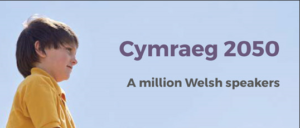by Dr Nia Cole Jones , Welsh Curriculum Tutor and Co-ordinator

It’s now over a year since we launched our fully bilingual PGCE in Wales. The challenges and rewards of offering a pan-Wales programme that offers future teachers the opportunity to study and work through the medium of Welsh, English or both have been numerous. The government requirement for all Initial Teacher Education Students across Wales to engage with Welsh language development and to map themselves on a linguistic skills framework, similar to the Common European Framework for Reference, is an essential component of our ITE provision. This is also a key component of the government’s Welsh 2050 strategy to develop a million Welsh-speakers by 2050 and its more recent action plan for 2021- 2016 where there is a clear focus on the lifelong learning of Welsh from Early Years, strengthening Welsh medium education, addressing the deficit of teachers who are able to teach through the medium of Welsh and Welsh as a subject, and improving the linguistic skills of the education workforce to meet the needs of their regions.
Therefore, there are increased expectations on ITE students to improve and teach Welsh language skills but there is limited research into students’ readiness to meet these requirements e.g., their knowledge, understanding, perceptions and attitudes. An interesting challenge is how to encourage all student teachers, regardless of their skills, to have a positive attitude towards improving their Welsh skills and that they foster a love for the language in their pupils. How can we ensure that students approach this aspect of their training with a positive attitude and as a way of deepening their connection with the language and land, to be able to offer their pupils a richer experience of education?
As the Welsh Language Curriculum Tutor and Co-ordinator, I will be assessing the impact of the requirement to develop and map their Welsh language skills on our student teachers. Do they feel positively about the language when they graduate? What impact has using Welsh in the classroom had on their pupils? Anecdotal evidence from our students so far has raised a number of interesting questions, e.g. how can we ensure that those entering the programme as non-Welsh speakers don’t feel that this will impact on their ability to be effective developers of their pupils’ skills? Which tools do they need to have to be able to do this effectively? How can we ensure that non-Welsh speakers feel that they will not be judged more harshly when they map their lower-level skills on the framework? The OU is in a unique position in Wales as it is the only provider who offers the PGCE qualification pan-Wales and is also the only provider to offer both a salaried and part-time route. The OU can therefore explore the attitudes of students across Wales and from numerous different backgrounds, considering geographical differences, differences across Welsh-medium and English-medium sectors and secondary and primary sectors. The slightly older age profile of our students also allows us to see whether there are any differences in attitudes between age ranges e.g., with those students who attended schools before Welsh second language GCSE became compulsory.
Language awareness is not always a part of the school curriculum; therefore students might not have an understanding of why the Welsh language would be important to them or their pupils. A key element of the ITE programme is language awareness sessions at the beginning of each module. These sessions are an opportunity to explore how the Welsh language has developed over time, specific events and legislation that have impacted upon it and Welsh in contemporary Wales and so go beyond linguistic skills and towards cultural competence. One focus of our research is to assess attitudes towards the Welsh language both before and after these sessions to investigate any changes in our student teachers’ perceptions. Do students identify with the culture of the Welsh language, and value the language and its culture on micro, meso and macro levels? This could be a key factor in identifying the provision we need to shape for our students in order to ensure that they can be agents of change who foster a love for the Welsh language in all schools in Wales. ‘Cenedl heb iaith, cenedl heb galon’: ‘A nation without language is nation without a heart’. How can we ensure that the Welsh language is at the heart of our ITE provision, and in the hearts of all our learners?

Dr Nia Cole Jones is Welsh Curriculum Tutor and Co-ordinator for PGCE Wales
Un o’r filiwn: datblygu sgiliau Cymraeg ymhlith myfyrwyr AGA
Mae dros flwyddyn bellach ers i ni lansio ein TAR gwbl ddwyieithog yng Nghymru. Mae’r heriau a’r gwobrau o gynnig rhaglen ar draws Cymru gyfan, sy’n cynnig cyfle i athrawon y dyfodol astudio a gweithio drwy gyfrwng y Gymraeg, y Saesneg neu’r ddwy iaith wedi bod yn niferus. Gofyniad y llywodraeth yw bod holl fyfyrwyr Addysg Gychwynnol Athrawon ledled Cymru yn datblygu eu Cymraeg ac yn eu mapio eu hunain ar fframwaith sgiliau ieithyddol, fframwaith-cymwyseddau-iaith-gymraeg-ymarferwyr-addysg.pdf (llyw.cymru), tebyg i Fframwaith Cyfeirio Cyffredin Ewrop ar gyfer Ieithoedd (CEFR). Ymgorfforir hyn yn elfen hanfodol o’n darpariaeth AGA ac mae hefyd yn rhan allweddol o strategaeth Cymraeg 2050 y llywodraeth Cymraeg 2050: Miliwn o siaradwyr (llyw.cymru) i greu miliwn o siaradwyr erbyn 2050, a’i chynllun gweithredu mwy diweddar ar gyfer 2021-2016. Rhoddir ffocws clir ar ddysgu’r Gymraeg drwy gydol oes, o’r Blynyddoedd Cynnar, cryfhau addysg cyfrwng Cymraeg, mynd i’r afael â’r diffyg athrawon a all addysgu drwy gyfrwng y Gymraeg a’r Gymraeg fel pwnc, a gwella sgiliau ieithyddol y gweithlu addysg i ddiwallu anghenion eu rhanbarthau. Cymraeg 2050: ein cynllun ar gyfer 2021 i 2026 [HTML] | LLYW.CYMRU
Gwelir, felly, fod disgwyliadau uwch ar fyfyrwyr AGA i wella eu sgiliau Cymraeg a’u sgiliau addysgu iaith ond prin yw’r ymchwil i barodrwydd myfyrwyr i fodloni’r gofynion hyn e.e. eu gwybodaeth, eu dealltwriaeth, eu canfyddiadau a’u hagweddau. Her ddiddorol yw sut i annog pob athro dan hyfforddiant, beth bynnag fo’i sgiliau, i fod ag agwedd gadarnhaol at wella ei sgiliau Cymraeg a meithrin cariad at yr iaith yn ei ddisgyblion. Sut y gallwn sicrhau bod myfyrwyr yn ymdrin â’r elfen hon o’u hyfforddiant ag agwedd gadarnhaol ac yn ei hystyried yn ffordd o ddyfnhau eu cysylltiad â’r iaith a’r tir, er mwyn gallu cynnig profiad addysg gyfoethocach i’w disgyblion?
Yn fy rôl fel Tiwtor Cwricwlwm a Chydlynydd y Gymraeg, byddaf yn asesu effaith y gofyniad i ddatblygu a mapio eu sgiliau Cymraeg ar ein hathrawon dan hyfforddiant. Ydyn nhw’n teimlo’n gadarnhaol at yr iaith ar ôl graddio? Pa effaith mae defnyddio’r Gymraeg yn y dosbarth wedi’i chael ar eu disgyblion? Mae tystiolaeth anecdotaidd gan ein myfyrwyr hyd yma wedi codi nifer o gwestiynau diddorol, e.e. sut y gallwn sicrhau nad yw’r rhai sy’n ymuno â’r rhaglen yn ddi-Gymraeg yn teimlo y bydd hyn yn effeithio ar eu gallu i ddatblygu sgiliau ieithyddol eu disgyblion yn effeithiol? Pa arfau sydd eu hangen arnynt i allu gwneud hyn yn effeithiol? Sut y gallwn sicrhau bod y di-Gymraeg yn teimlo na fyddant yn cael eu barnu’n llymach pan fyddant yn mapio eu sgiliau lefel is ar y fframwaith? Mae’r Brifysgol Agored mewn sefyllfa unigryw yng Nghymru gan mai dyma’r unig ddarparwr sy’n cynnig y cymhwyster TAR ledled Cymru a’r unig ddarparwr hefyd i gynnig llwybr cyflogedig a rhan-amser. Gall y Brifysgol Agored felly archwilio agweddau myfyrwyr ledled Cymru ac o gefndiroedd amrywiol, gan ystyried: gwahaniaethau daearyddol, gwahaniaethau ar draws sectorau cyfrwng Cymraeg a chyfrwng Saesneg a’r sectorau uwchradd a chynradd. Mae proffil oedran ychydig yn hŷn ein myfyrwyr hefyd yn ein galluogi i weld a oes unrhyw wahaniaethau mewn agweddau rhwng ystodau oedran e.e. y myfyrwyr hynny a fynychodd ysgolion cyn i TGAU Cymraeg ail iaith ddod yn orfodol.
Nid yw ymwybyddiaeth iaith bob amser yn rhan o gwricwlwm yr ysgol, felly efallai na fydd myfyrwyr yn deall pam y byddai’r Gymraeg yn bwysig iddynt hwy neu i’w disgyblion. Elfen allweddol o’r rhaglen AGA yw darparu sesiynau ymwybyddiaeth iaith ar ddechrau pob modiwl. Mae’r sesiynau hyn yn gyfle i archwilio sut mae’r Gymraeg wedi datblygu dros amser, digwyddiadau penodol a deddfwriaeth sydd wedi effeithio arni a’r Gymraeg yn y Gymru gyfoes, felly ânt y tu hwnt i ddatblygu sgiliau ieithyddol a thuag at ddatblygu cymhwysedd diwylliannol. Un ffocws sydd gan ein hymchwil yw asesu agweddau tuag at y Gymraeg cyn ac ar ôl y sesiynau hyn er mwyn ymchwilio i unrhyw newidiadau yng nghanfyddiadau ein hathrawon dan hyfforddiant. Ydynt yn uniaethu â diwylliant y Gymraeg, ac yn gweld gwerth i’r Gymraeg a’i diwylliant ar lefelau micro, meso a macro? Gallai hyn fod yn ffactor allweddol wrth adnabod y ddarpariaeth sydd angen i ni ei llunio ar gyfer ein myfyrwyr er mwyn sicrhau y gall pob un fod yn gyfrwng newid sy’n meithrin cariad at y Gymraeg yn holl ysgolion Cymru. ‘Cenedl heb iaith, cenedl heb galon’. Sut y gallwn ni sicrhau bod y Gymraeg wrth wraidd ein darpariaeth AGA, ac yng nghalonnau ein holl ddysgwyr?
You raise excellent suggestions for research here Nia; this is research which could be extremely influential in shaping provision, not purely on the OU PGCE, but in supporting Welsh language awareness development more broadly across Wales. I look forward to hearing more about the findings.
I always wonder whether part of the issue for our student teachers, who are not native Welsh speakers themselves, is how confident they feel showing themselves as non-experts/a learner to their own students/pupils? It takes a lot of confidence, I think, to admit you’re learning just like everyone else – particularly during a PGCE when you’re trying to build up your confidence to be a leader of learning. This is really thought provoking, Nia, thank you for raising this.